Ms. Lu Thi V., (Yen Thanh commune, Tuyen Quang province) grew up amid the familiar advice of adults in the village: "Girls study a lot, spend money, do nothing", or "Girls, if you are at home, you can have a good life, don't dream of climbing high". The words from her grandparents and that close relative have followed her throughout her childhood.
She remembers that she had to persevere in convincing herself to finish high school. It was a persistent struggle and in the end, she still could not continue to study at university. That story is not an isolated case. She said that in her village, many women only have high school education or even do not have all of high school. The biggest purpose of their life is still to get married, harvest kitchen corners, garden, and take care of their children. When women do not have a stable income and are economically dependent on their husbands, their voice in the family is often taken lightly, and their role in important decisions is also narrowed.
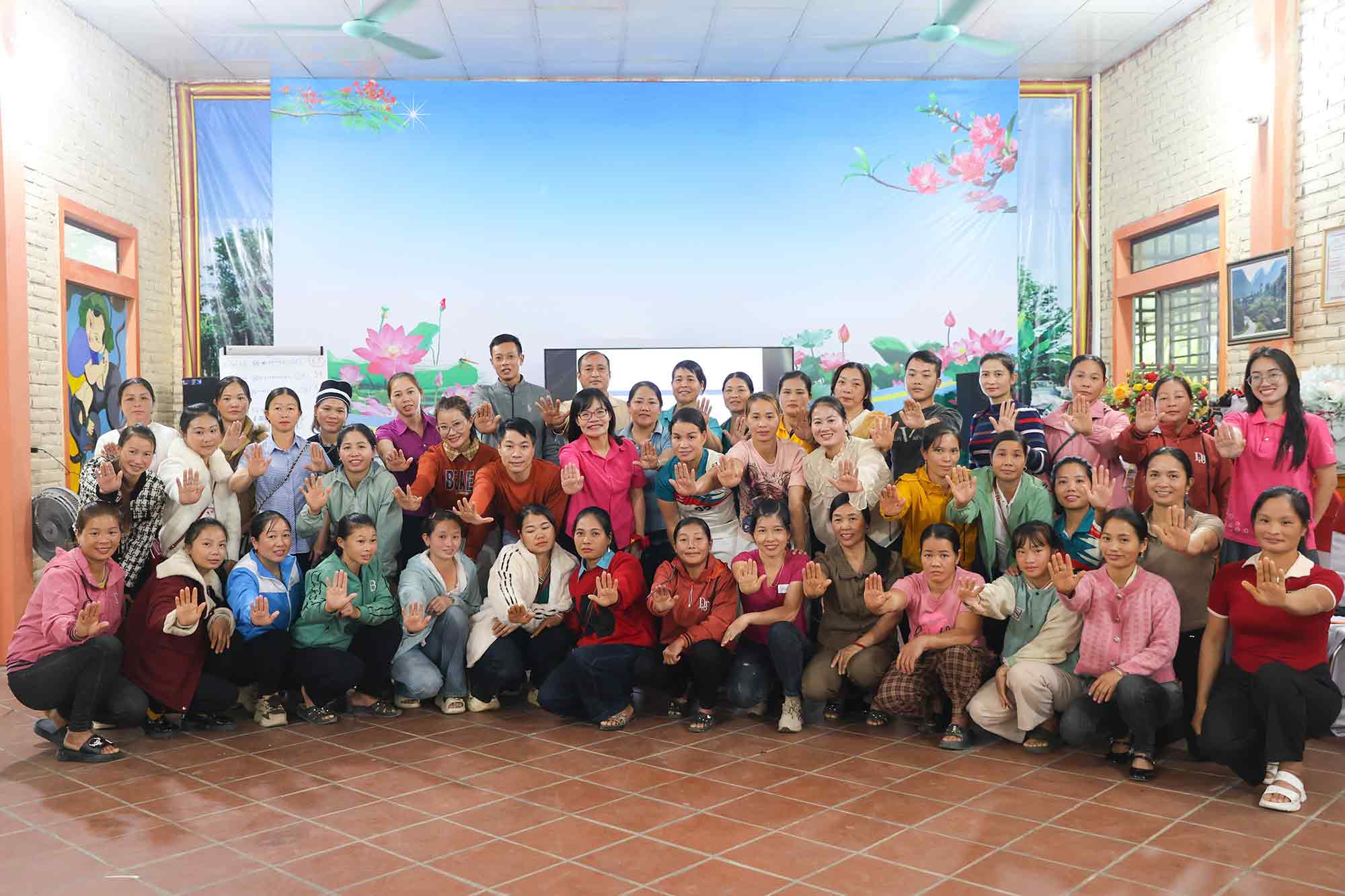
Therefore, she is increasingly appreciating the value of education and the spread of gender equality messages. If I had studied more, I would have been able to change many things faster, she said. That desire brought her to the training course on "Gender equality in the context of family economic development" organized by the Vietnam Golden Star Fund (VSF) within the framework of the Campaign "10 kg of oranges 2025 - Gender equality and safety for women and girls in the digital age".
The course has 40 participants who benefit from the Livelihood Support Fund of the Vietnam Golden Heart Fund, from ethnic minority groups such as Dao Do, Dao Ao Dai, Tay, Mong, Nung... communities that still face many barriers in accessing opportunities for economic and social development. The training is designed to support in parallel with livelihood activities, helping women borrow capital to improve their self-determination, use capital effectively and promote gender equality in the family.
The training course is directly run by Lecturer Tran Hong Diep - Director of the Fund for Vietnamese Stature and Lecturer Vu Xuan Thai - Manager of the Fund for Vietnamese Stature Program.
When the seed of gender equality is called out and change begins from each family
Change does not come from anyone alone. It comes from the companionship between husband and wife, between parents and children, between one generation and the next. And perhaps, that is the most beautiful thing that small classrooms in Tuyen Quang have replanted: the seeds of change are brought to each roof and silently grow over time.
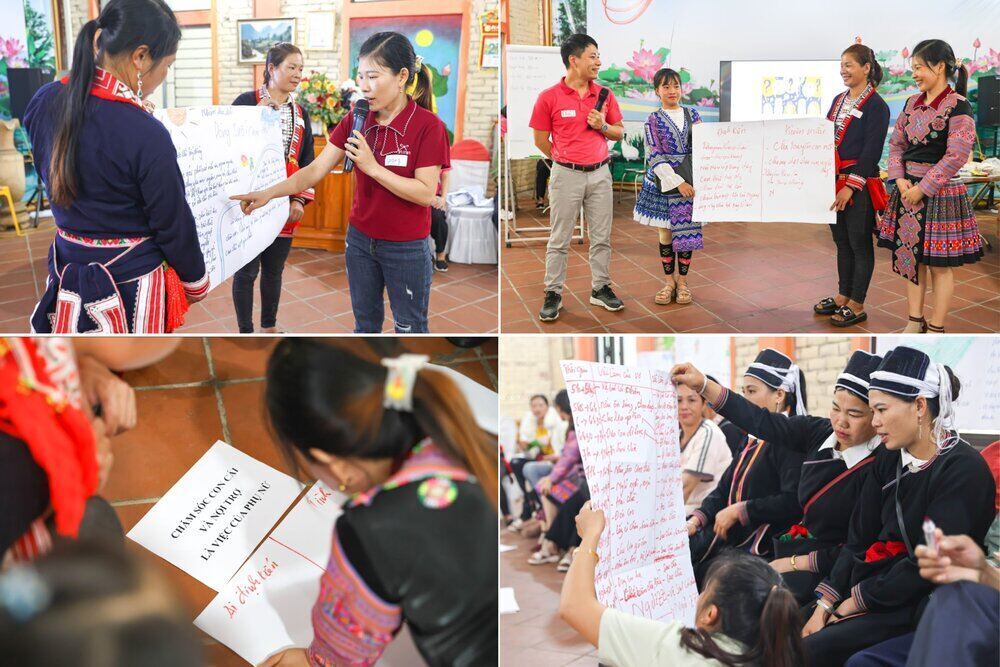
During the two school days, what impressed Ms. V. the most was her first understanding that gender discrimination and gender role are the root of inequality. Through games and lively activities, she learned to identify prejudices in the most familiar places such as in the story of a loanwife, the accidentally spoken words of an adult, or jokes that she had never asked before. "Calling their names" helps her understand more deeply why women in her hometown still face many difficulties and barriers.
"Now I know where the problem lies, then I can talk to my husband and parents," she shared.
When she returned home, she planned to tell her husband about what she had learned, because she knew he also wanted to change. "Gender equality that only women try is very tiring, both husband and wife can work together," she said.
Sharing the same thought with Ms. V. was Mr. Trinh Xuan T. (Yen Thanh commune, Tuyen Quang province), one of the few men attending the course. He said he was really surprised to see that gender inequality is also harmful to men. In the group discussion on the consequences of gender equality, he realized that the role models that have long been imposed on men such as men must be strong, men must be pillars, ... unintentionally create heavy pressure. It makes them always have to show resilience, not showing emotions, even though that is a basic human need.
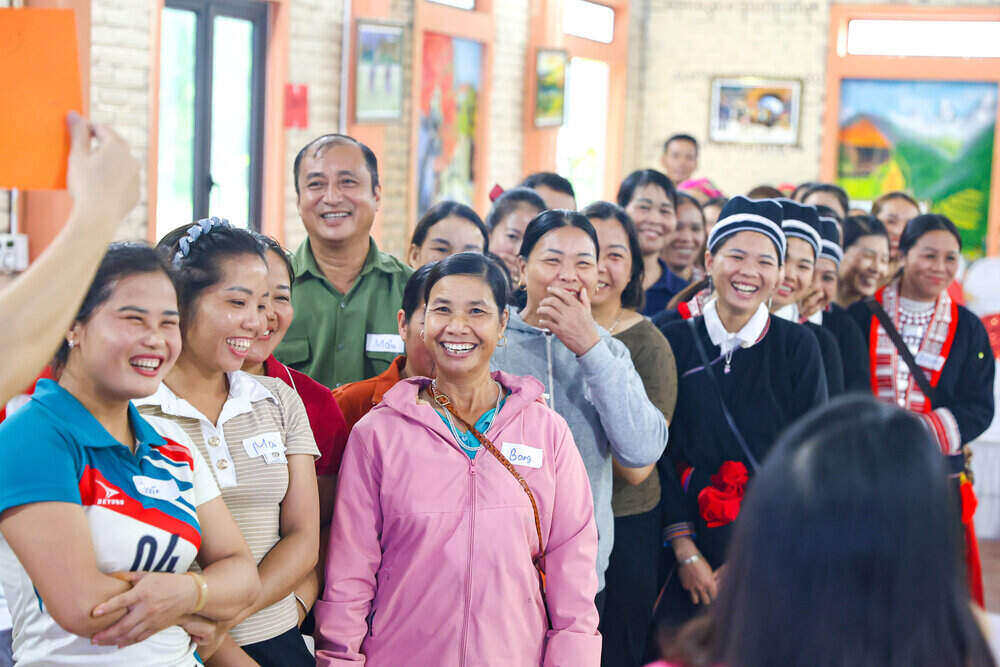
Mr. T. hopes that in the future, there will be more men participating in the training course on gender equality. Photo: Lan Linh
I feel relieved to realize that I dont always have to strive to be the strongest person.It turns out that women and men are bound by the same gender models.- Mr. T.
shared.After the training, he also understood that when women have the opportunity to participate in labor and develop the economy more equally, the "pillar" burden of men is also shared, and family income is more stable.He hopes that in the coming time, more men will participate in similar classes, because if only women talk about gender equality, change will be very slow.
Protect yourself and build family safety
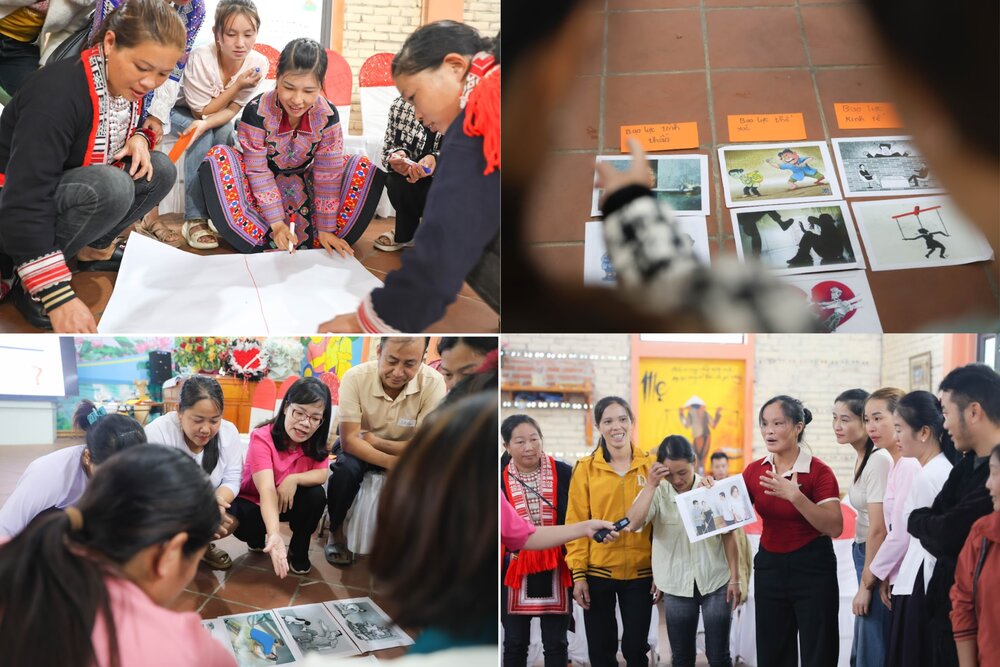
In addition to learning about gender and gender discrimination, the training course also helps learners practice skills in preventing and responding to domestic violence. Through paintings and short simulation situations, participants of the training course were identified as 4 types of domestic violence, including: physical violence, mental violence, sexual violence and economic violence. Not only stopping at identification, the class also analyzed in depth the causes of violence as well as the consequences for victims, families and the community.
Before, I thought beatings were just violence, but now I understand that spying or controlling money is also an act of violence. And that made me realize that domestic violence is more common than I thought and anyone can become a victim, said Ms. Phan Thi T. (Thong Nguyen commune, Tuyen Quang province).
She was especially impressed with the safety planning part. Previously, she had vayed up thinking that if something was wrong, she should seek help or temporarily take shelter to a safe place. But this is the first time she has been instructed to develop a complete plan, including identifying people who can support, preparing important documents in advance, setting a safe password, and how to contact in case of emergency. She believes that this will help her be more proactive when bad situations occur.
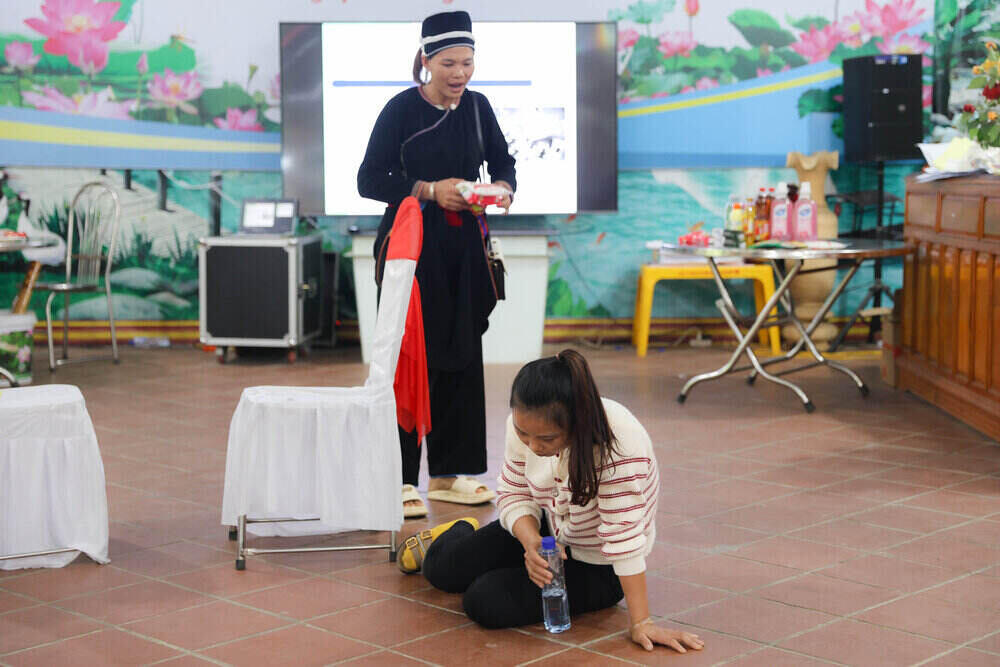
With two daughters, one in grade 3 and one in grade 9, she said she would share this knowledge with them. No one knows in advance. When I know how to protect myself, I feel more secure, she said.
Sowing seeds equally
The results of the pre-training survey show that up to 75% of students agree with many popular models and prejudices such as "women have to take care of housework" or "men are better at leadership". After two days of studying, 100% of students said they did not agree with the above models and prejudices, and wanted to erase these concepts.
The change in awareness is reinforced by highly interactive training methods, helping participants proactively analyze and contact life. Learning through situations, plays and group activities not only makes knowledge easy to remember but also encourages learners to share their views and question things that are considered "natural".
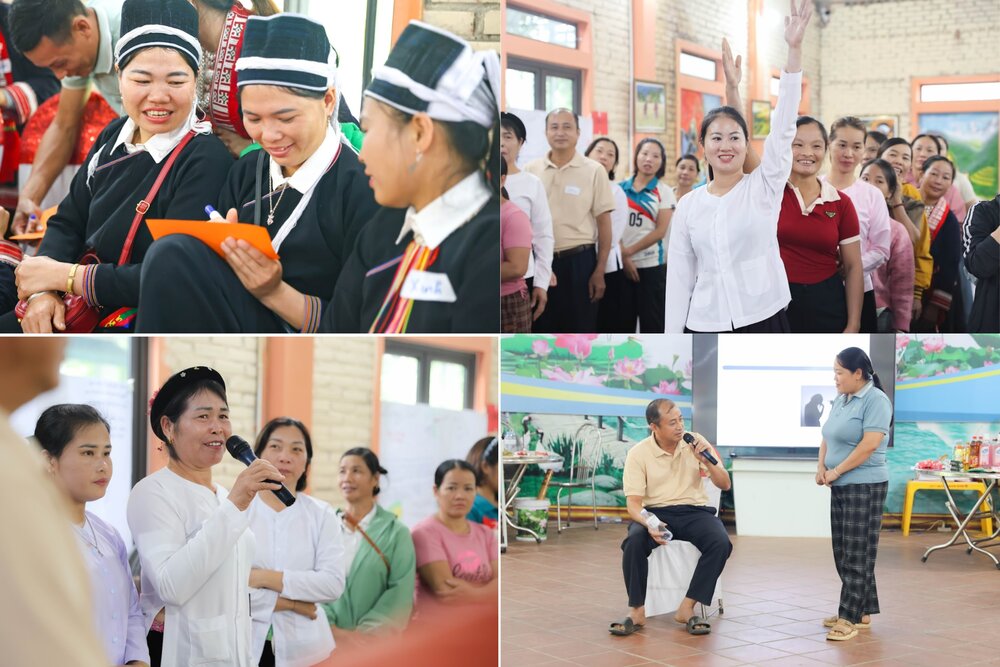
Two days of training in Tuyen Quang may not be enough to eliminate gender stereotypes and prejudices that have existed for many generations, but have contributed to creating the first conversations in each family. And from those conversations, the changes seep into life in the way husband and wife share housework, the way parents discuss their children's studies, or the way mothers tell their daughters about their own rights.
Change does not come from anyone alone. It comes from the companionship between husband and wife, between parents and children, between one generation and the next. And perhaps, that is the most beautiful thing that small classrooms in Tuyen Quang have replanted: the seeds of change are brought to each roof and silently grow over time.
"2025 Orange Village - Gender Equality and Safety for Women and girls in the Digital Age" is a campaign implemented by the Vietnam Golden vision Fund, TH Group, BAC A BANK and TH School System in response to the "month of Action for Gender Equality and Prevention and response to Gender-Based violence" launched by the Vietnamese Government. This is the 4th year that the Fund has accompanied partners to implement the To Orange Campaign.
Previously, from the fundraising fund of the To To Cam 2024 Campaign, the For Vietnamese Stature Fund supported 600 million VND in livelihood capital for two cooperatives (HTX) owned by ethnic minority women in Tuyen Quang province. This capital directly helps 18 cooperative members expand production and bring indirect benefits to more than 60 satellite households involved in growing, processing and consuming products.











